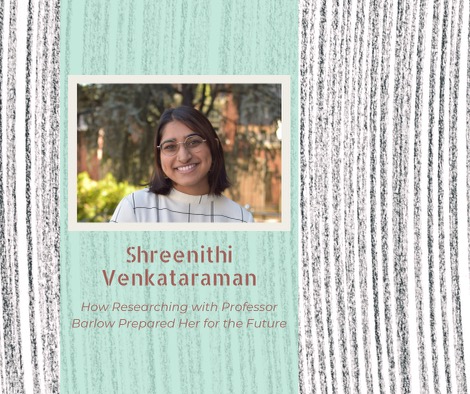WLP alum Shreenithi Venkataraman shares how her time as a research assistant with WLP professor Dr. Barlow helped prepare her academically and professionally.
During her time at GW, 2022 GW graduate and Distinguished Scholar Shreenithi Venkataraman had the opportunity to serve as a research assistant for WLP’s assistant professor of writing, Dr. Jameta Barlow. In this role, Venkataraman not only conducted research into womanist frameworks in Black girls’ and women’s health, but developed crucial work skills she did not anticipate learning.
“I was able to also gain a lot of program management skills, which I definitely didn’t expect going into being a research assistant,” Venkataraman shared about planning a university seminar for faculty with Professor Barlow. The learning Venkataraman gained through her role as research assistant, however, didn’t just stop at research and management skills—often, she also found academic applications. “There were a lot of times that I sat in Public Health classes, even as I went into…the upper level classes, that I was like ‘Okay, cool. I understand how this works because I have done this with Dr. Barlow,’” Venkataraman explained.
Venkataraman’s research with Dr. Barlow was also enriching because it related to her studies as a public health
major with a minor in gender studies. “For me, it was always really important that science be aware of the social conditions that society exists within,” Venkataraman shared. “Public health felt like a really beautiful intersection of those two points.”
Because of her understanding of how she wants to utilize public health, Venkataraman has a clear goal in mind for herself. While currently looking for a program management job that incorporates research in the area of health-equity, she knows that ultimately, she would like to work within Asian American or South Asian American communities. Ideally, her work would also specifically focus on working with women.
“Creating that personal connection to something within [public health] makes learning a lot easier, and makes your contribution to what you’re doing a lot more significant too,” Venkataraman said.


